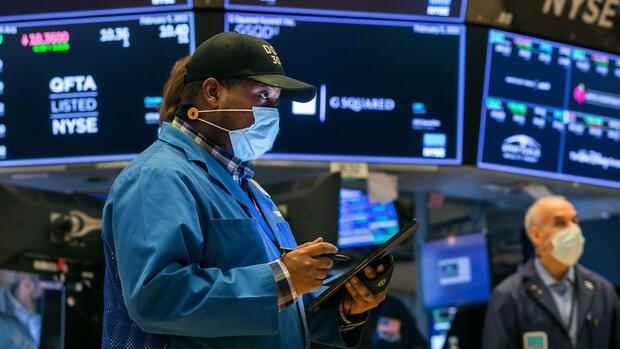Frankfurt The prospect of an early end to the crisis aid for the US economy has given the New York stock exchanges a tailwind. The S&P 500 index caught up after initial losses and went out of trading on Wednesday with an increase of 0.3 percent to 4363 points. Tech companies such as Amazon and Microsoft were also in demand, which helped the technology-heavy Nasdaq index to increase by 0.7 percent to 14,562 points. The Dow Jones index, however, remained at 34,385 points
Investor confidence increased after the release of the minutes of the September interest rate meeting of the US Federal Reserve. It is expected to cut back its extensive economic aid from mid-November, as the document emerged. Every month, $ 15 billion less bonds are to be bought on the market in the future, and the bond purchases, which were launched to stabilize the economy, should then be over by mid-2022. However, the monetary authorities were divided on the right time to increase the key interest rate, which is currently between zero and 0.25 percent.
The minutes made it clear that the Fed is ready to get out of crisis mode and that it sees the risks associated with the bond sales, said analyst Edward Moya of online broker Oanda. However, it is also becoming apparent that the Fed continues to assume that the inflation will be temporary. “That could turn out to be a fallacy and we will likely see that the market will view inflation as the greatest risk.”
Inflation in the US rose surprisingly strongly in September by 5.4 percent. Experts had expected the inflation rate to remain at the August level of 5.3 percent.
Top jobs of the day
Find the best jobs now and
be notified by email.
Concerns about persistently high inflation figures
Although it is not a large overshoot, the market seems to be more concerned in the face of persistently high inflation figures, said capital markets expert Caleb Thibodeau of analysts Validus Risk Management. “If the recent pace of increased inflation continues, it could cause the Fed to begin phasing out stimulus sooner rather than later, which could hurt stocks and other risk assets,” said Nancy Davis, founder of asset manager Quadratic Capital Management.
Shares in Citigroup, Goldman Sachs, Morgan Stanley, Wells Fargo & Co and Bank of America Corp lost up to two and a half percent. Traders pointed to the flattening yield curve on the bond market, which is depressing banks’ profitability.
Equities from the energy sector were also weaker. Exxon Mobil fell 0.7 percent. Schlumberger, Hess, Devon, APA and Diamondback Energy were among the biggest losers in the industry. Investors in the oil market were worried about the economy, although oil prices were able to break away from their interim lows. The North Sea variety Brent was just down at $ 83.39 per barrel.
The Organization of Petroleum Exporting Countries (OPEC) lowered its demand forecast for the current year, but kept it for 2022. The rise in energy prices, on the other hand, could support the market for oil products, according to Opec.
Tech heavyweights such as Facebook, Microsoft, Nvidia, Amazon.com, Google parent company Alphabet, Advanced Micro Devices and Tesla, on the other hand, grew. Analysts assume that the numbers of US companies in the third quarter will be generally good. However, worries about financial burdens from delivery bottlenecks are increasing. US President Joe Biden has already rounded up heads of supermarket chains and parcel services to ensure the important Christmas business.
Look at further individual values
Apple: Apple is already feeling the effects of the delivery bottlenecks. According to a media report, the iPhone manufacturer wants to cut production on its new 13-series model. The shares fell 0.4 percent.
JP Morgan: The US bank reported earnings of $ 3.74 per share for the third quarter, well above the consensus estimate of $ 3.00. CEO Jamie Dimon said the quarter went well despite the negative economic impact of the Delta option and supply chain disruptions. Due to the flattening yield curve on the bond market, the shares fell by 2.6 percent.
Blackrock: The asset manager posted adjusted earnings of $ 10.95 per share for the third quarter, beating the consensus forecast of $ 9.35. Revenue also exceeded estimates, despite lowering some fees. Assets under management grew, albeit less strongly than analysts expected. Blackrock’s papers rose nearly four percent.
Delta Air Lines: With an adjusted quarterly profit of 30 cents per share, the airline exceeded the estimates by 13 cents, and sales were also above forecasts. Delta’s quarterly profit was the first since before the pandemic, but the company expects a modest loss in the current quarter due to higher fuel costs. The share fell by 5.8 percent.
Plug Power: The manufacturer of hydrogen fuel cells rose by 11.8 percent. The company had announced a partnership with Airbus to decarbonise air travel and airport operations. A US airport is to be selected as the first “hydrogen hub” pilot airport.
Qualcomm: The enterprise announced a new $ 10 billion share buyback program. The chip maker’s newly announced buyback is on top of the $ 900 million remaining from a buyback program launched in July 2018. The share gained two percent.
More: Private assets rise to a record high in the corona crisis
